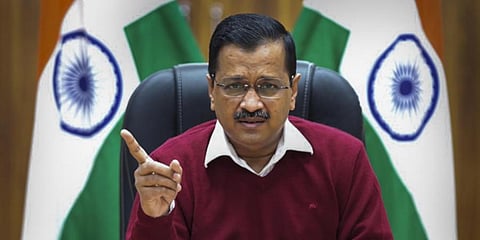

There are no second thoughts about Arvind Kejriwal being a master strategist of poll campaigns. His success in Delhi assembly polls is largely attributable to his ability to target the voter groups with timely lollipops. Such allurements have given him good returns in electoral battles.
Just a few days ahead of the just concluded Municipal Corporation polls in the national Capital, he tried to wean the ‘authorised colonies’ his way. With the focus of his beneficiary policies so far being the electorally powerful ‘unauthorised colonies’, Kejriwal surprised many when he talked about empowering the Residents Welfare Associations (RWAs), empowerment being a synonym for releasing funds directly to them.
In the course of the campaign, he declared, “Today, we want to say that if the AAP comes to power in the MCD after the municipal poll, we are going to really empower RWAs. We will give them political and financial powers. If any other party’s councillor comes to power, he will not allow RWAs to work.”
It may be noted that the RWAs play an important role in the areas where Delhi Development Authority (DDA) built apartments or cooperative housing society flats were built on the land allotted by the DDA.
The municipal wards where the RWAs have a role spread across the city from Dwarka to Janakpuri, Vikaspuri to Rohini, Pitampura to Shalimar Bagh, Dilshad Garden, Patparganj, Vasundhara Enclave and Mayur Vihar in trans-Yamuna, colonies spread across South Delhi from Sarita Vihar to Munirka and Vasant Kunj. In the older times, the RWAs were largely curated by the BJP sympathisers and the party enjoyed the patronage of leaders like Madanlal Khurana.
In 1998, when the Congress government led by Sheila Dikshit came to power, realizing the changing population profile of the city, it was decided by Congress too to cultivate the RWAs. Dikshit came out with a very progressive plan called Bhagidari, which was an initiative for citizen-government partnerships. The Bhagidari scheme was an important initiative that involved people, including the city’s resident welfare associations and civic society, in the decision-making process. It was an initiative aimed to promote participatory democracy.
When the Bhagidari scheme was launched, about 11 citizen groups were identified. It later grew to more than 2,000 groups. Under the scheme, monthly meetings were held with the RWAs, which Dikshit addressed personally through video conferencing. Citizens complained about water shortage, broken pipelines, poor condition of roads and bill-related complaints. There were local officers sitting at one end of the online interaction, while senior officials sitting at the other end. They interacted with each other and discussed the problems.
The scheme also had some monetary allocation for the RWAs under which they could write to the local sub-divisional magistrate to get their minor works done. Dikshit government received an award from the Commonwealth Community as well as the United Nations for best practices in governance for the Bhagidari scheme. The programme, however, lost traction after the Congress was defeated in 2013. Kejriwal wants to revive it now.
The question which should be asked is why was Bhagidari scheme, which also benefitted Kejriwal’s and Sisodia’s NGO Parivartan, was dismantled in the first place. The second is why the rush to talk about the scheme and engage with RWAs just ahead of the elections.
Probably an effort by the Aam Aadmi Party leader to strengthen their traction with the middle-class and the upper-middle-class colonies, which have now come to dominate the electoral map. The merger of the three municipal bodies and delimitation of seats may have made Kejriwal look beyond the usual followers and spread the net of ‘rewdis’, which has made him win several elections in the past, beyond the unauthorized colonies and jhuggi clusters. Let’s keep our fingers crossed on how it works.
Sidharth Mishra
Author and president, Centre for Reforms, Development & Justice